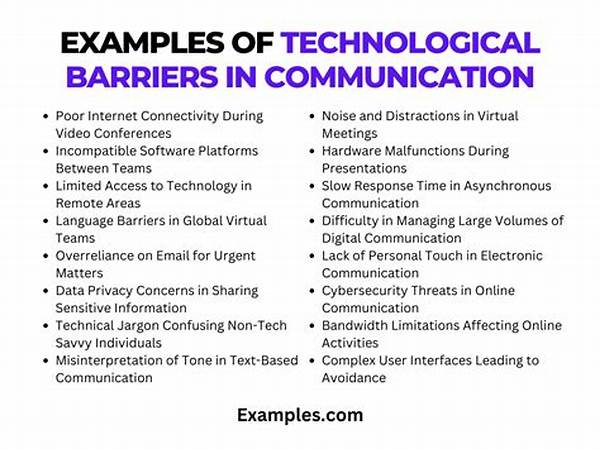In today’s rapidly evolving world, technology is both a driving force and a challenge. While it brings countless opportunities for innovation and progress, there are significant barriers to technological expansion. These barriers can hinder growth and limit access to transformative advancements. In this article, we will explore these roadblocks in detail, shedding light on why technological expansion is often not as seamless as one might expect.
Read Now : Naval Combat Command And Control
The Human Element: Resistance and Reluctance
The human element is a major player when it comes to barriers to technological expansion. Let’s face it, folks are creatures of habit. Change is a big ask, and not everyone is on board with tech taking over their turf. People can be pretty skeptical about new gadgets and gizmos, especially if they think their jobs are on the line. Plus, there’s the good ol’ fear of the unknown. Not everyone is a tech whiz, and learning new systems can be daunting. Throw in some privacy concerns, and it’s no wonder people are dragging their feet. So, while tech might be blazing a trail into the future, it’s gotta jump through some serious hoops thanks to human resistance.
Infrastructure Woes and Tech Hiccups
1. Spotty Networks: You know how it goes. Tech expansion hits a wall when folks are stuck with wonky Wi-Fi or no signal in sight. If the backbone ain’t solid, how’s tech gonna stretch its wings?
2. Tech is Pricey: Cash rules everything, right? So, when new tech costs an arm and a leg, that’s a huge barrier to technological expansion. Not everyone’s got deep pockets.
3. Old Systems: Picture this – shiny new tech, but it’s shackled to ancient software. Old systems can choke new tech’s vibe, making expansion a real struggle.
4. Laws and Rules: Tech’s marching to its own beat, but laws and regulations can pump the brakes. Navigating red tape ain’t easy, and it can slow down the tech train.
5. Cultural Differences: Tech isn’t one-size-fits-all. Different places have their own quirks, and cultural barriers to technological expansion can really throw a wrench in the works.
Economic Disparities: The Rich and the Rest
Now, let’s get real about money – it’s a major barrier to technological expansion. There’s a big divide between those who can afford the latest tech and those who can’t. In economically challenged regions, the funds just aren’t there to support wide-scale tech rollouts. It’s not just about buying the gadgets; it’s also about the infrastructure and maintenance costs. This disparity means that while some places are living in the future with smart cities and AI-driven everything, others are stuck in the past. This digital divide is a beast to tackle, and it’s holding back a lot of regions from hopping on the tech bandwagon. Closing this gap is key for making tech available to everyone, everywhere.
Legal and Regulatory Challenges
Here’s the deal: every time tech tries to break new ground, it’s gotta tango with laws and regulations. These legal barriers to technological expansion can seriously cramp the style of innovators trying to push the envelope. Here are ten issues that crop up:
1. Data privacy laws that can limit tech growth.
2. Intellectual property rights that can be tough to navigate.
3. Industry-specific regulations that vary by location.
4. Challenges in complying with international standards.
Read Now : Naval Gun System Advancements
5. Licensing requirements that bog down tech development.
6. Complex cross-border trade laws.
7. Restrictions on digital content.
8. Emerging tech facing old-school regulation hurdles.
9. Antitrust scrutiny can limit tech mergers.
10. The fast pace of tech outpacing slow regulatory updates.
Education and Skill Gaps
The education system is supposed to nurture the next-gen tech gurus, but there are barriers to technological expansion when schools aren’t up to snuff. Students need proper training to ride the tech wave, but outdated curriculums can’t keep up with rapid changes. When institutions lag, the skill gap widens, leaving companies struggling to find the talent they need to innovate. And hey, let’s not forget those already in the workforce. Without ongoing training, current employees might find themselves lost in a tech-driven world. Upskilling and reskilling are crucial to helping bridge this gap, ensuring workers stay relevant in a digital age.
Social and Cultural Barriers
Wrapping up the barriers to technological expansion, social and cultural hurdles are no joke. Different societies have their own norms and practices, and tech’s gotta respect that. Introducing newfangled systems can clash with traditional values or belief systems, resulting in pushback. Plus, some communities just don’t trust tech, fearing its impact on social dynamics and job security. It’s not only about bringing tech to the table; it’s about doing so with sensitivity, understanding local concerns, and engaging communities throughout the process.
Summarizing all these issues, it’s clear that tech expansion isn’t just a walk in the park. There are financial, educational, legal, and cultural obstacles in the mix. Only by acknowledging and addressing these barriers to technological expansion, can we truly harness the power of tech for everyone’s benefit.




